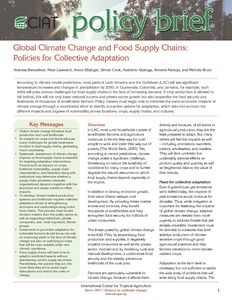Global climate change and food supply chains: policies for collective adaptation
Abstract
According to climate model predictions, most parts of Latin America and the Caribbean (LAC) will see significant temperature increases and changes in precipitation by 2050. In Guatemala, Colombia, and Jamaica, for example, such shifts will pose serious challenges for food supply chains in the face of increasing demand. If crop production is allowed to fall behind, this will not only lower national income and private sector growth but also jeopardize the food security and livelihoods of thousands of smallholder farmers. Policy makers must begin now to minimize the socio-economic impacts of climate change through a coordinated effort to identify pro-active options for adaptation, which take into account the different impacts and degrees of vulnerability across locations, crops, supply chains, and cultures.

